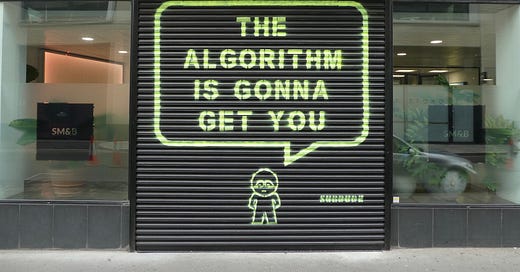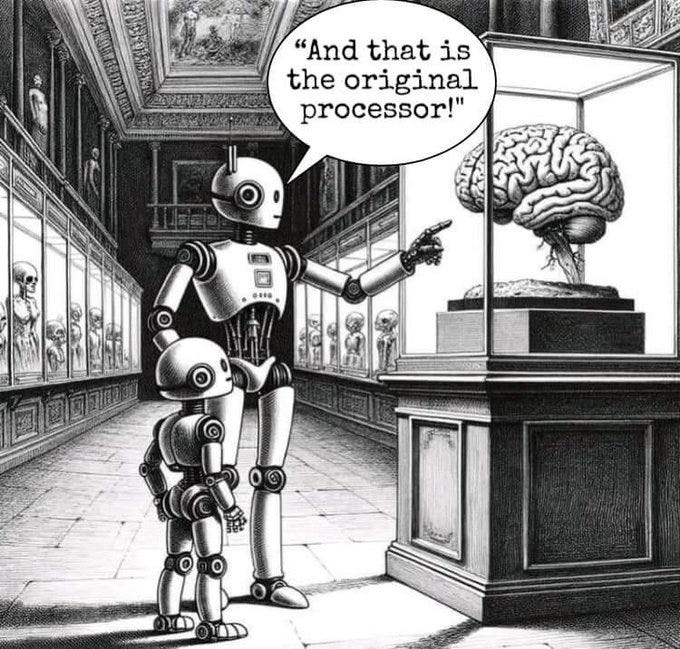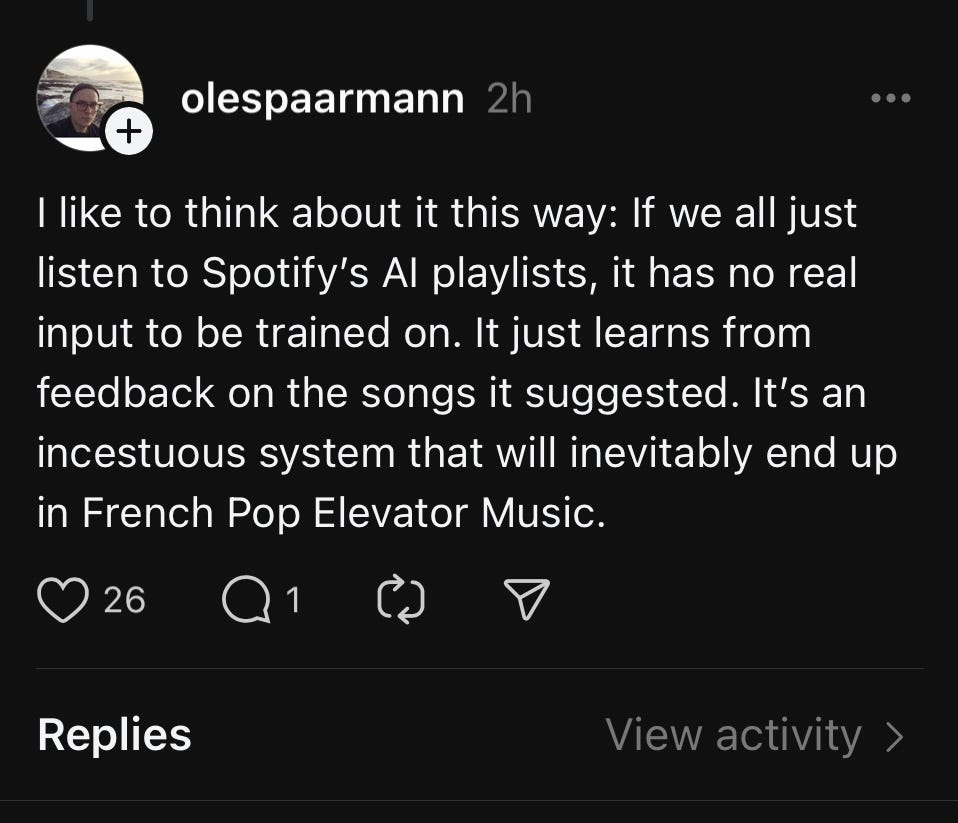Hello Dear Reader
This offering is a bit dense, apologies, and has next to no news in it. But as I will soon start the album cycle of flogging you stuff, I’d rather squeeze in one more random brain dump before I have to put on my big girl pants as CEO of my own indie label.
Some of you may recall a newsletter of mine from last year - ‘Every Future Is A Thought Experiment’ - where I pondered among many things, Jamiroquai, This Morning and AI. At the time, Chat GPT had just been released and the usual doom-mongers on X were generating lists like The Top Ten Jobs That Won’t Exist by 2030 and whether we’d all be extinct at the hands of Robocop or Black Mirror’s Metalheads. I mean maybe that will still happen, but according to that list lawyers won’t exist either so there’s always an upside.
A year on, my thoughts on AI haven’t really changed. You will never dissuade me that, like pretty much everything in life, you get what you give. This is to say, if there is some bad code somewhere, things will fall apart. It’s just a matter of when. Sometimes, it’s merely inconvenient, like when Tesla drivers get what’s coming to them and find they have spent ££££££s on a stubbornly immobile hunk of metal after an update goes awry - and sometimes it’s on the scale of the recent Crowdstrike meltdown. With regards to AI, machine learning is all good and well, but the first machine it’s gonna learn from will be a human, just itching to screw everything up whether intentionally or not.
I’ve been thinking about this because I just finished reading a book that I think you might enjoy. Glenn McDonald’s excellent You Have Not Yet Heard Your Favourite Song - How Streaming Changes Music charts, as best as he is legally allowed to, his time at Spotify as one of the key creators of its Discover algorithm. As well as being a data scientist, he is a music nerd of the highest order. I picked up the book because, on paper, I hold his kind responsible for ruining music. Or, if not ruining music, then reducing it to cold hard data and something that must fit into one of the six thousand genres he has spent a large part of his adult life formulating.
Perhaps because he is well aware that as someone who was part of a very small team who made arbitrary decisions about what kind of artists were closer to other artists (at one point he describes them deciding that Kate Bush was closer to Bowie than to Suzanne Vega which, to be fair, I think we could all live with), towards the end of the book he posits some rules for what he calls ‘algorithmic responsibility’. Tellingly, he says:
‘Secrecy is pathology. All algorithms should be auditable. This sounds simple enough in itself, but from my personal experience making algorithmic things I know all too well that we don’t always audit the results ourselves or even think about their auditability.’
This, for me, was a lightbulb moment. How much of our lives are governed by algorithms we neither consciously consent to nor understand? It’s not that we couldn’t understand them - it’s that because in a capitalist framework we’re never going to be allowed to. Corporate competition naturally begets secrecy, otherwise how else might one stay ahead of the competitor. But, in the case of companies like Spotify, when their content is almost entirely dependent on third parties, don’t they owe us the right to know how our content and data is manipulated? Music artists are effectively business partners with Spotify and yet, unlike other partnerships where due diligence and transparency are the foundation of co-operation, we are flying blind. There is a whole industry of online grift dedicated to telling hopeful creators that if they just pay X amount they’ll show them exactly how the algorithm works and what content they need to make to game it. Without accountability, McDonald says:
‘there’s no good basis for trust. Is Discover Weekly fair, or a cesspool of payola and corruption? I know the answer, but only from data that you can’t get and I’m not allowed to give you. You shouldn’t have to trust me, and even if you trust me, you shouldn’t be reliant on my questions aligning with yours to get answered.’
This is madness, no? Why should the whole way we promote or consume creativity be shrouded in secrecy and at the whim of a few individuals who only ever describe their MO in metaphor? And what happens when corporations dispense with people like McDonald - individuals who are plainly passionate about music and using technology within some kind of moral framework - and replace them with individuals solely obsessed with profit, and when they realise they could make more money, replace those people with a machine learning ouroboros.
Clearly our phones have reached the point where they can read our minds because shortly after I wrote this paragraph, the following post caught my eye on Threads:
Somewhere along the line, drunk on Marshall McLuhan’s pronouncement that the medium is the message, social media companies realised their business was to be neither media nor particularly social but to change the nature of human behaviour in such a way that we would be dependent on their mode of delivery for not just our entertainment, but in many cases, our livelihoods. We can bleat all we like about online versus in real life but it’s too late now. Walk down any high street, take any train, sit in any coffee shop and if there’s one person not on their smartphone, that person is - as the memes will tell you - a psychopath.
This isn’t a diatribe against smartphones - they are pieces of extraordinary computing. But we live in an age of classification, and not everyone is equipped for this. From childhood I always felt there were two kinds of musicians - those who savoured the theory and the mathematical aspect and those who eschewed it or suffered it just as much as they needed to. Always somewhere in the middle, when I got to music college I realised I was actually physically allergic to the people who banged on about the Phrygian mode but couldn’t write a song to save their life and never seemed to describe music in terms of how it made them feel. I began to see these people as colonisers of human expression. They were also the people who couldn’t just listen to a record without telling you where it sat in The Canon. FUCK THE CANON, I wanted to say to them. FUCK THE FUCKING CANON.
And yet…without these folk who are compelled to categorise absolutely everything, where would we be? Without them, there can be no order from chaos. But it is painful for a lot of musicians, I think, who trade in feels, not data, and who pursue music to escape a world of capitalist mundanity. Most of us would do it for free - many of us in fact do.
Still, how grateful I am for that kind soul somewhere who spent ages compiling my favourite Yacht Rock playlist on Spotify. Or the jazz geek somewhere out there who uploaded one of the weirdest records I have ever heard in my life onto YouTube - Hear, O Israel - A Prayer Ceremony in Jazz, check it out, it’s totally bizarre - and the other geek at Resonance FM who played it at random one afternoon and then the other geek in Tokyo from whom I bought one of the few CDs of it in existence on eBay.
Geek love indeed.
And what connected us all? Our passion for music. And how did we connect? Because venture capital dumped a load of cash into tech companies who made it all possible. Through our smartphones.
It’s a conundrum, innit.
A lot of you reading are both avid physical music consumers - for that I heartily thank you - and are always hungry for new music, and nothing can scratch that itch quite like streaming. Would I like to live in a world without streaming? God no. But would I like us all to live in a world where streaming was more equitable? God yes.
Where else are we gonna find a playlist comprised entirely of every version ever made of Wham!’s Last Christmas, all 2393 of them? (Yep. I’m on there. A very proud moment.)
Until next week when I shall be popping into your inbox on Friday August 23rd with news about the new album and the first single from it and a very special tour, all that remains is for me to wish you a very merry Christmas.
With love as ever,
Nerina xxx
Photo credits:
1. No idea who took the photo but the street art is by Subdude who is consistently brilliant.
Again, I was unable to source the creator of this charming cartoon.
I hope this random person on Threads doesn't mind that I screenshotted his post. I mean, it’s available for all to see but thank you very much Oles Paarmann whoever you are.







If the best the algorithm can do is establish that my YouTube needs ALL of the couples food touring Dublin because I watched one, then I may have to be disappointed in my few remaining years. If only Justin Timberlake had been successful resuscitating MySpace, where actual people decided who they wanted to hear . Best of luck with the new album!
There is a problem with AI - it can build algorithms, without a logic process being clear. And it's no better than the data it was "trained" on.
Audit is HARD